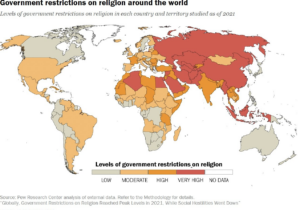New York State is passing a law requiring social-media networks to publish plans to respond to what is vaguely called “hate” speech. An excellent explanation of the full range of the law is given by Eugene Volokh in the Wall Street Journal. Part of these plans is a requirement for the network to report on any speech that might, inter alia, “humiliate… a group” based on “religion.”
In this very same State, on August 12, 2022, author Salman Rushdie was stabbed by a man who asserted that the novelist had humiliated his religion, Islam, and that his attack was driven by the late Iranian Supreme Leader Ayatollah Khomeini’s 1989 fatwa declaring Rushdie’s novel, The Satanic Verses, blasphemous. Khomeini called for Rushdie to be killed “so that no one will henceforth dare insult the sacred beliefs of Muslims.” The man accused of the stabbing, Hadi Matar, stressed that his motivation was that the author “attacked Islam, he attacked their beliefs, the belief systems.”
Meanwhile, Hamline University, a United Methodist-affiliated school in St. Paul, Minnesota, has dismissed the instructor of a global art history class for showing an image of Islam’s prophet Mohammad. The teacher had given advance notice to the class that she would do so and that students who did not want to participate were free to be absent. Nevertheless, the Dean of Students called her actions “undeniably inconsiderate, disrespectful and Islamophobic.”
Apart from being repressive, the University’s action is ignorant, perpetuating the myth that all Muslims believe visual portrayals of Mohammed are blasphemous. The illustration in question was in a manuscript by a 14th-century Muslim scholar. Iran is full of pictures of Mohammed. There are numerous portrayals in medieval Afghan, Uzbek, Ottoman, and, especially, Persian Islamic art. Closer to home, the north frieze on the Supreme Court building in Washington, D.C., features a bas-relief where Mohammed is shown as a law-giver.
Much of America still regards such “humiliation” and accusations of blasphemy and insulting beliefs as narrowly religious matters and thus marginal and unimportant. Indeed, most seem oblivious to the connections between such restrictions and multiplying wider general controls on any speech deemed by some to be undesirable. This parochial attitude is becoming increasingly out of step with some major international trends.
There is now a growing international effort to resist punitive restrictions on blasphemy and apostasy, which occur mostly but not exclusively in Muslim-majority countries. One part of this effort is the welcome work of the International Religious Freedom or Belief Alliance (IRFBA). This Alliance is an outgrowth of the intergovernmental Ministerial gatherings on religious freedom that began in the State Department in 2018 and which on February 5, 2020, began with an initial Alliance of 27 member states.
The members of the Alliance now number 37 countries: Albania, Armenia, Austria, Australia, Bosnia and Herzegovina, Brazil, Bulgaria, Cameroon, Colombia, Costa Rica, Croatia, Cyprus, Czech Republic, The Democratic Republic of Congo, Denmark, Estonia, The Gambia, Georgia, Greece, Hungary, Israel, Kosovo, Latvia, Lithuania, Malta, the Netherlands, Norway, Poland, Romania, Senegal, Sierra Leone, Slovakia, Slovenia, Togo, Ukraine, the United Kingdom, and the United States. There are also five IRFBA “friends”: Canada, Guyana, Japan, South Korea, and Sweden, as well as three “observers”: the Sovereign Order of Malta, Taiwan, and the United Nations Special Rapporteur on Freedom of Religion or Belief.
One of IRFBA’s priority goals has been to combat restrictions on blasphemy and apostasy–today some 70 countries criminalize such beliefs and activities. It focused particularly on the death penalty for these offenses, present in Afghanistan, Brunei, Iran, Maldives, Mauritania, Nigeria, Pakistan, Qatar, Saudi Arabia, Somalia, United Arab Emirates, and Yemen.[i][i]
On November 7, 2022, the Alliance again stressed “the interconnected nature of freedom of religion or belief with other human rights, and note how blasphemy laws impede the freedoms of expression and religion or belief in ways inconsistent with the Universal Declaration of Human Rights and the International Covenant on Civil and Political Rights….” It expressed “firm opposition to blasphemy laws and other laws that penalize individuals for exercising their freedom to choose a faith, practice a faith, change their religion, not hold a religion, tell others about their beliefs and practices, or openly debate and discuss aspects of faith or belief….”
Hence, it urged “governments to impose moratoriums on executions for blasphemy or related offenses, and unconditionally release individuals imprisoned based on their views on matters of religion or belief that may differ from official narratives or the views of majority populations….”
This Alliance’ stance did not appear out of the blue. It drew on a March 9, 2021, joint statement, led by Australia, to the 46th session of the United Nations Human Rights Council. This statement stressed that “Religious freedom and tolerance are vital for open and resilient societies…. We urge states to release individuals currently on death row or otherwise imprisoned for these offenses.”
This reflected the 2020 report by the UN Secretary-General, which in relation to a Moratorium on the use of the death penalty declared that “The death penalty should never be imposed as a sanction for non-violent conduct such as apostasy, blasphemy, witchcraft, adultery and same-sex relations.” This particular focus on the death penalty helps draw the support of countries that are opposed to the penalty per se, but it also reflects the realization that blasphemy accusations involve much more than religion narrowly understood,
This in turn reflected the March 5, 2019, report by Ahmed Shaheed, then the UN Special Rapporteur on Freedom of Religion or Belief, to the UN Human Rights Council in Geneva, which lamented the “revival of anti-blasphemy and anti-apostasy laws, a proliferation of, and increasing reliance on, public order laws to limit expression deemed to be offensive to religious or belief communities….”
In matters of religion, the difference between “hate speech” that “humiliates” a group based on religion, such as that propounded by the State of New York, and “blasphemy” in the international context is a very thin one. Followers of a religion may feel themselves insulted if something they believe is insulted. An insult to the divine can be treated as tantamount to insulting those people who worship that divine—becoming in effect a form of “insult” or “hate speech” against believers.
Doubtless, New York State is not in favor of executing or stabbing those purportedly engaged in humiliating another’s religion. But it is implicitly supporting the position that people like Salman Rushdie have been wrong in what they have written and that those like him who are accused of such humiliation need to be reported on and reined in.
Iran and the Taliban might be pleased with these faint echoes of their repression of deviant religious views.
[ii][i] Since 2015, numerous States have repealed blasphemy laws that had not been used for decades: Iceland (2015), Norway (2015), Malta (2016), Denmark (2018), Canada (2018), Greece (2019), New Zealand (2019), Ireland (2020), and Scotland (2021). https://bridges.monash.edu/articles/report/Killing_in_the_Name_of_God_State-sanctioned_Violations_of_Religious_Freedom/16748866







 Sponsor a student for Christianity & National Security 2024
Sponsor a student for Christianity & National Security 2024